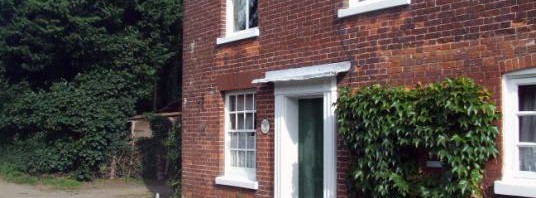Malcolm Bradbury & Andrew Blanch’s account of life growing up in Tunstead
Crowgate Shop

The shop closed in 1971 because it couldn’t make enough money. We’d be making about £3 a week. My wife was not well and I had to decide whether to give up work and look after the shop or let it close. There were some people in the village who didn’t have transport, like George Smith, so I kept it going, but it just didn’t make enough.
That was the start of the supermarkets, like Roys, and you couldn’t compete on prices. Before Roys had their supermarket, you got served from a big counter – where MacDonalds is now – just a large counter and you had to ask for everything.

Malcolm: If you wanted to upset her Effie, then what you’d do is to go and ask her for a gallon of paraffin at tea time. She’d be cross because she’d be cooking the tea and wouldn’t want to stop to fill your gallon can.
I moved up here for work, but then took on the Horse and Groom and worked it for 25 years. There was an old Aga in the kitchen, which was good for baking bread. Do you remember Gladys? I remember Gladys in here one night, and she’d had a few bevies, and she was playing darts with some of the others, and she was doing her best to light up a stick of chalk. Behind the pub I used to grow lots of vegetables and sell it to Roys. They were always slow in paying for it, which was unfair. I’d give them stuff and if they hadn’t sold it after 3 days, they’d have to chuck it away. But they always held back on the money they owed you.
Andrew: I went to Ashmanhaugh school, not the Tunstead one, because we weren’t supposed to cross the [railway] line. We were told they were trouble the other side of the line! There was the little old wooden Baptist chapel just up the road, and we used to go every Sunday. David Shreeve, a lay preacher, came from Ashmanhaugh most weeks, and occasionally we’d get Dan Mount and he was a right fist-thumper. He’d put the fear of God into us, shouting and pointing, telling us we were sinners.
There was a children’s home or an orphanage, as I remember, over near the church at Tunstead Rectory. It was run by Mrs Nichols who worked for the church. We used to call them the vicarage children – I don’t know where they came from, and I don’t think it ran for very long. I don’t remember it after 1954. I do remember there was a coloured girl, only because we’d never seen a coloured girl before. We’d seen some of the American soldiers from the airbase who were coloured, but this was different.
Malcolm: Years ago, the Queen and Prince Philip drove through here, along Market Street. They’d flown into RAF Coltishall. I don’t know where they were going – probably Roys. There were no great crowds lining Market Street, so she didn’t have to wave. I bet she said “That was lovely driving through Tunstead.” The landlord in the pub – he was relieved they didn’t stop because they don’t carry any money.

